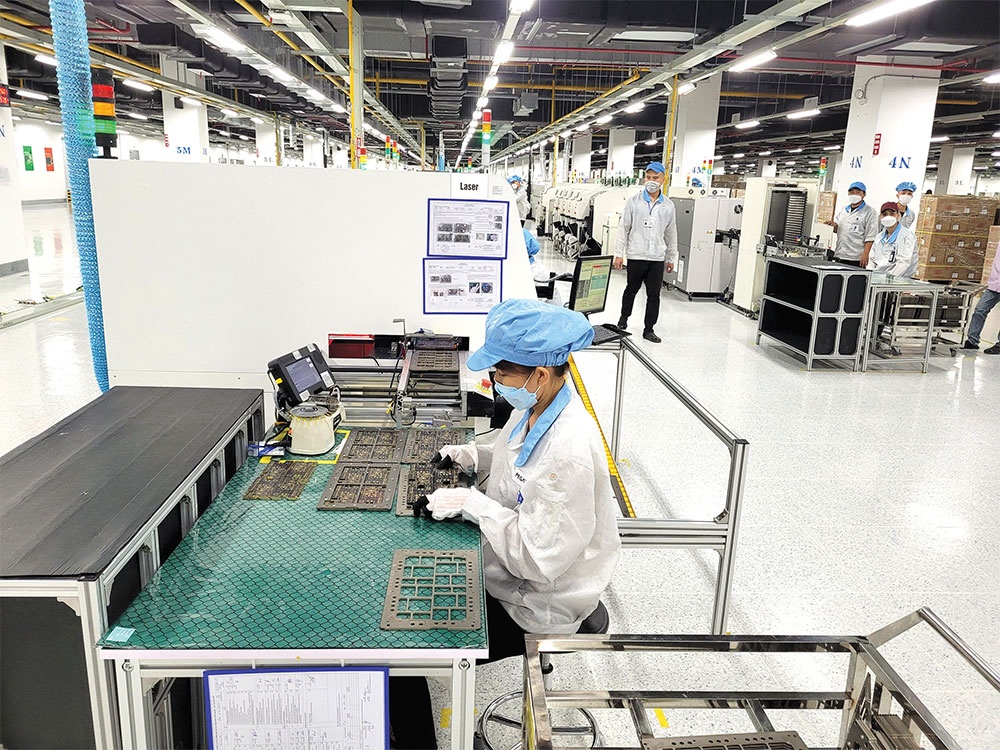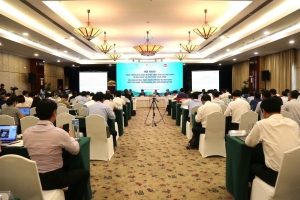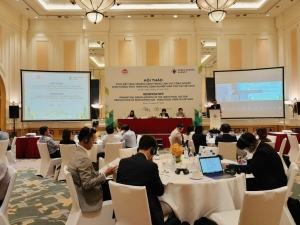Illustrating the critical need for top eco-industrial parks
Vietnam had just over 400 industrial zones as of 2022, with around 290 of them functioning in 61 cities and provinces. Over the previous 30 years, businesses in industrial zones (IZs) have grown and will continue to do so in the coming time.
 |
| Florian J. Beranek, lead expert of Responsible Business Development at the UN Industrial Development Organization |
According to the Ministry of Planning and Investment (MPI), as of August, IZs and economic zones attracted more than 10,000 domestic projects and nearly 11,000 foreign-invested projects with the total registered capital of about $340 billion, of which investment capital from abroad was around $230 billion. Foreign capital in processing and manufacturing at such facilities accounts for 70-80 per cent of all registered capital.
However, IZs have the potential to have severe environmental and social consequences such as climate change, pollution, resource depletion, labour concerns, and community disruption, all of which must be properly handled.
The expectations of today’s national and international stakeholders for environmental, social, and governance criteria are driving the demand for eco-industrial parks (eco-IPs), particularly in global manufacturing powerhouses such as Vietnam.
Eco-IPs can be defined as managed industrial areas that promote cross-industry and community collaboration for common benefits related to economic, social, and environmental performance.
The concept has evolved to address additional, interrelated aspects, including resource efficient and cleaner production, industrial symbiosis, climate change, pollution, social standards, shared infrastructure, improved management of risks, and shared resources, including land and ecosystem services.
In short, eco-IPs are about creating more resource-efficient and cost-effective parks which are more competitive, attractive for investment, and risk resilient. Now, the key policy framework to make them thrive is in place.
Supporting the establishment of an appropriate legal framework for eco-IP development is a crucial component of the Global Eco-Industrial Parks Programme, a United Nations Industrial Development Organization (UNIDO) effort funded by the Swiss State Secretariat for Economic Affairs. In Vietnam, UNIDO has collaborated closely with the government, notably the MPI, to develop Decree No.82/2018 on IZ management. In the same vein, the project has supported its revision into Decree No.35/2022/ND-CP on the management of IZs and economic zones, adopted in 2022.
Decree 35 introduces several significant changes as compared with the 2018 decree, which are expected to create a more simplified legal framework for investors making an investment in IZ projects. It consists of eight chapters and 76 articles, regulating infrastructure investments, the establishment of new facilities, development policies, a national information system on state management, and more.
In comparison to the older decree, Decree 35 in Articles 36-45 provides clearer legal instructions on the transition of brownfield parks to eco-IPs, as well as establishment (greenfield), including prerequisite requirements on social and technical infrastructure, services, and company ratio within parks that have undergone resource efficiency and cleaner production assessments.
The decree also sets a framework for industrial symbiosis among tenant enterprises, as well as methods for yearly monitoring and reporting. Through a series of regulations, it also defines guidelines for what may be deemed an eco-business.
 |
| Updated legislation demonstrates how seriously Vietnam wants to expand its eco-IP plans, Le Toan |
The new decree also promotes the use of eco-IP techniques by evaluating financial incentives for developers and eco-businesses: “Domestic and international donors will be granted green credit at financial institutions and foreign bank branches in Vietnam in accordance with the law on environmental protection and other relevant laws; and issue green bonds in accordance with the laws on bond issuance and on environmental protection.”
UNIDO, together with the World Bank Group and the German Development Agency, has developed an international framework that provides guidance on what constitutes an eco-IP and how a park can work towards becoming one. The framework is based on prerequisites and performance indicators in four key categories: management performance, environmental performance, social performance, and economic performance.
The prerequisites highlight the basic requirements for eco-IPs and the performance indicators describe expected performance levels that they must meet. As a baseline, IPs must comply with all applicable local and national regulations.
A number of countries around the globe have adopted an international framework to measure the performance of their park or, are developing their own national eco-indicators based on the international framework. Vietnam is one of them.
It is not a certification or audit scheme. The framework is a practical means to understand the current status and intentions of an IZ concerning their eco-transformation and identify a set of practical promising opportunities for the park through a process of continuous improvement.
The Vietnamese government is convinced that widespread adoption of the eco-IP idea will help to attract more green investments with added value, allowing them to stay up with changing worldwide market demand and, ideally, increase income.
Although the adoption of such parks may result in higher initial expenses for tenants, production, and company, it is predicted that they will be able to de-risk their operations in the long term and access new and higher-return markets.
To encourage developers to embrace green ideas, the government is developing regulatory frameworks that grant such developers favourable rates on loans from national sources in order to persuade investors to follow the eco-IP model.
Overall, the shift to environmentally and socially responsible, transparent, and sustainable business operations will benefit all stakeholders and eventually contribute to the socioeconomic development of Vietnam and its hard-working people.
 | Vietnam to encourage eco-industrial parks with international support Vietnam will continue to encourage investors to both develop eco-industrial parks and transition traditional to ecological ones. |
 | Eco-industrial parks to become inevitable trend Vietnam will continue to encourage investors to both develop eco-IPs and transition from traditional to ecological ones, which is set to contribute to the national target of reducing greenhouse gas emissions. |
What the stars mean:
★ Poor ★ ★ Promising ★★★ Good ★★★★ Very good ★★★★★ Exceptional
Related Contents
Latest News
More News
- Construction firms poised for growth on public investment and capital market support (February 11, 2026 | 11:38)
- Mitsubishi acquires Thuan An 1 residential development from PDR (February 09, 2026 | 08:00)
- Frasers Property and GELEX Infrastructure propose new joint venture (February 07, 2026 | 15:00)
- Sun Group led consortium selected as investor for new urban area (February 06, 2026 | 15:20)
- Vietnam breaks into Top 10 countries and regions for LEED outside the US (February 05, 2026 | 17:56)
- Fairmont opens first Vietnam property in Hanoi (February 04, 2026 | 16:09)
- Real estate investment trusts pivotal for long-term success (February 02, 2026 | 11:09)
- Dong Nai experiences shifting expectations and new industrial cycle (January 28, 2026 | 09:00)
- An Phat 5 Industrial Park targets ESG-driven investors in Hai Phong (January 26, 2026 | 08:30)
- Decree opens incentives for green urban development (January 24, 2026 | 11:18)

 Tag:
Tag:


















 Mobile Version
Mobile Version